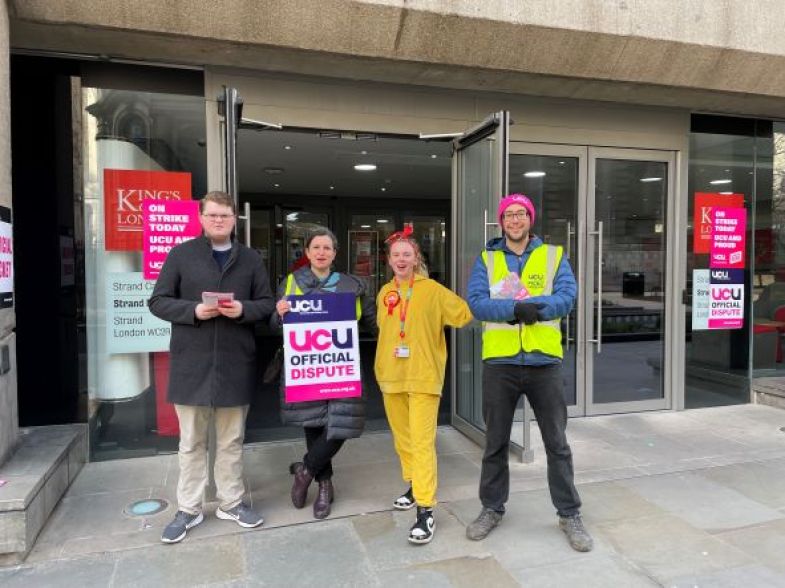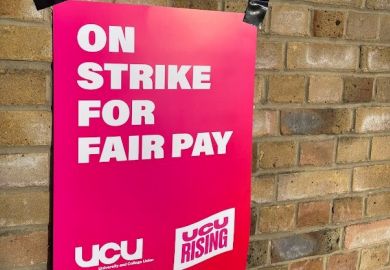UK university staff have returned to the picket lines after a controversial pause in their strike action, showing little belief that an end to the disputes was close, despite both sides claiming progress in negotiations.
The 15 March strike – timed to coincide with the government’s budget and industrial action being carried out by teachers, junior doctors and Tube workers – marked the start of six consecutive days of University and College Union (UCU) walkouts, the longest stint of the campaign so far.
It came at a crucial time for the union – which was balloting members again to extend the mandate for action into the summer assessment period – and had just agreed the terms of reference for detailed negotiations with employers, covering a review of the UK HE pay spine, workloads, contract types and equality pay gaps. Members said they wanted to send a message to the employers that they were determined to “see the dispute through”.
But some have speculated that a decision to cancel strikes in February to allow for intensive talks to take place had harmed momentum and the union’s negotiating position. Questions have also been raised over the union’s tactics, especially claims about large reserves at a time when some universities were struggling financially.
UCU general secretary Jo Grady visited the picket lines at the University of East Anglia, one of the institutions hardest hit by financial troubles, with cuts to staff numbers likely because of a multimillion-pound deficit.
She hailed the progress in the talks with employers as a “breakthrough” which was “down to the strength, determination and sacrifice of university workers”.
For his part, Raj Jethwa, the Universities and Colleges Employers Association (Ucea) chief executive, welcomed progress in “constructive meetings” and said there was “genuine determination from all parties” to make progress “despite ongoing strike action attempts and further threats of disruption.”
At Birkbeck, University of London – another of the institutions to have suffered cuts – Evan Sedgwick-Jell, a third-year PhD student and associate lecturer in the psyschosocial studies department, said there was a “huge amount of damage being done to the college and its subject specialisms”, but that did not mean battles for better pay and against casualisation should be neglected.
“A lot of the activists in our branch are young, casualised. If we don’t fight right now there is not going to be much of a career left for us in higher education,” he said.
The branch had just initiated plans to hold its own local ballot to take additional strike action alongside the national dispute, a “historic move” for the institution where such a step had never been taken previously.
“It is really important not to fall into what, in my mind, is a trap of saying can’t we afford to have it all”, Mr Sedgwick-Jell said.
“As a union we need to go from what is currently a defensive struggle to more expansive demands around what we want education to look like. We want to go back to a situation where student numbers are down and staff have manageable workloads.”

UCU said the talks with employers would “pave the way for the Universities Superannuation Scheme pension to be restored by August 2024, to end the use of involuntary zero-hour contracts in higher education, and to agree new standards, frameworks and principles to tackle other forms of casualised contracts, reduce workloads and close equality pay gaps”.
Members were being asked whether strikes due to be held next week should be stood down to formally consider the offer, with the union's Higher Education Committee meeting on 17 March to decide next steps.
Any further pause in the action before a deal is agreed was likely to be opposed by some in the union. At King’s College London, Lucia Pradella, senior lecturer in international political economy and vice-president of the UCU branch, said she believed the previous pause had been a mistake and saw the latest strike action as “just the beginning of a further escalation of action that will lead to a marking and assessment boycott”.
“We want to push employers and the government to set a different set of priorities,” she said. “There is the potential to rebuild the momentum now.”
Support was “massive” in the current re-ballot, she added, with the branch hopeful of securing a higher turnout than the 73 per cent it achieved last year.
At King’s, growth in student numbers had far outstripped the increase in staff numbers, according to Dr Pradella, with big implications for staff workloads and the quality of students’ education.
She said fixing the sector’s problems required more investment, beginning with a proper pay rise for staff. Ucea has implemented the first part of its offer – worth between 5 and 8 per cent – but Dr Pradella claimed union calculations had shown universities could afford to pay at least a further 3.5 per cent on top of this. Vice-chancellors have said previously the latest offer was at the limit of affordability.
In addition, the branch wanted King’s to raise the London weighting allowance staff are paid from £4,000 to £6,000.
“We have people who simply cannot afford their rent. Lecturers, even senior lecturers, are scared they don’t have money to feed their children,” Dr Pradella said.
Tim Pringle, reader in development studies at SOAS University of London, said he did not have confidence that talks between the unions and Ucea – overseen by the Advisory, Conciliation and Arbitration Service – would yield enough progress to stop the strikes.
“I really hope employers will see sense and bring some stability back to higher education, but I can’t say I’m that optimistic,” he said.
“We are still strong, we are still determined to see this dispute through...I hope the message is strong and they take it seriously.”
“I’ve been a branch rep throughout this dispute, I would say there is probably more enthusiasm for action now than there has been,” he continued. “We don’t want to be on strike but people seem more determined than they were four years ago. That’s coming from the fact there is pressure on wages, the cost-of-living crisis, the incompetence of government policy in HE and a failure to address casualisation and workloads.”
Register to continue
Why register?
- Registration is free and only takes a moment
- Once registered, you can read 3 articles a month
- Sign up for our newsletter
Subscribe
Or subscribe for unlimited access to:
- Unlimited access to news, views, insights & reviews
- Digital editions
- Digital access to THE’s university and college rankings analysis
Already registered or a current subscriber? Login








